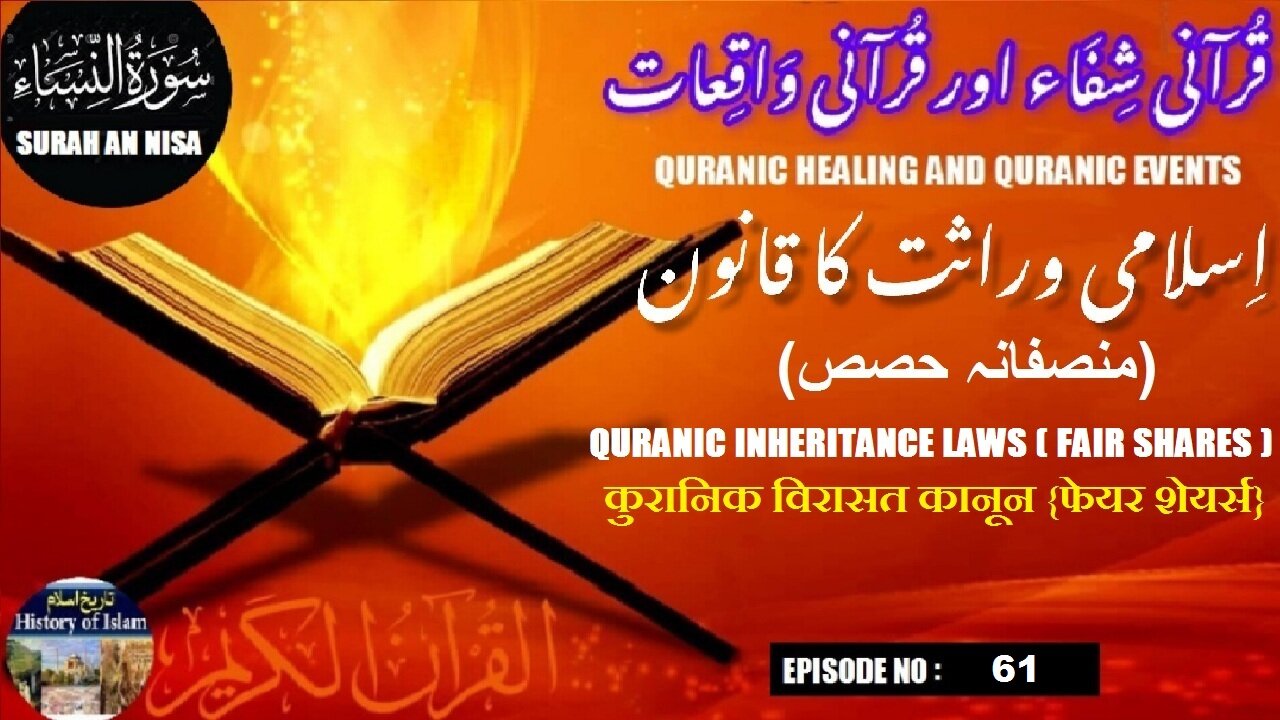Premium Only Content

Quranic Inheritance Laws {Fair Shares} कुरानिक विरासत कानून قرآنی وراثت کے قوانین {منصفانہ حصص}
@islamichistory813 #understanding #quranic #inheritance #laws #fair #shares #for #men #and #women #healing #and #events #from #the #quran #historical #stories #and #events #quranicstories #selfhealing #success #stories #striking #events #in #history #quranstories, #storiesfromthequran #religious #creation #stories #trending #quran #short #historical #loves #historical #heroes #what #is #true #strength #calm #quran #recitation #for #babies #islamic #healing
Understanding Quranic Inheritance Laws: Fair Shares for Men and Women (4:7)
Assalamu Alaikum, wa Rahmatullahi wa Barakatuhu.
Brothers, sisters, friends and elders, we are presenting the 61th episode of the Islamic informative video based on healing and events from the Holy Quran, and in this episode we will describe, Understanding Quranic Inheritance Laws: Fair Shares for Men and Women (4:7)
The Quranic inheritance laws, found in various verses, provide a comprehensive framework for the distribution of wealth after the death of a person. These laws, particularly outlined in Surah An-Nisa (4:7), highlight the importance of ensuring that both men and women have a rightful share in the inheritance. The idea behind these laws is not just a matter of distributing wealth, but also promoting fairness, social justice, and balance within the family structure. Inheritance is seen as a divine decree meant to ensure the stability and well-being of the family and society.
In the Quran, inheritance laws are designed to ensure that all family members—whether male or female—receive a portion of the deceased’s estate. The Quranic injunctions are very clear in stating that both men and women are entitled to inherit, but the proportion of the inheritance varies depending on the role of the inheritor in the family structure and the relationship to the deceased. Surah An-Nisa (4:7) specifically addresses the need for both men and women to receive their respective shares, saying, "For men is a share of what the parents and close relatives leave, and for women is a share of what the parents and close relatives leave, be it little or much, an obligatory share."
In essence, this verse establishes a clear directive that inheritance is not to be restricted to one gender, and both men and women are entitled to inherit from the deceased’s estate. However, it also introduces a system where the amount of inheritance is determined by the familial relationships and roles. For example, the Quran specifies that a male heir typically receives a share twice the size of a female heir's share in certain cases. This can be understood in light of the financial responsibilities that men traditionally carry in a patriarchal society, such as providing for the family and supporting dependents. Thus, the higher share for men often reflects the expectation that they will use their inheritance to fulfill these financial duties.
Despite this differentiation in the shares of men and women, the Quranic inheritance laws have a deep sense of justice. The fact that women are entitled to inherit at all, a significant departure from many pre-Islamic societies where women were often excluded from inheritance, is a major reform. In the early days of Islam, women’s rights to inheritance were a revolutionary step that gave them control over their wealth, ensuring they were not left destitute or dependent on others. These laws marked a significant move toward gender equality in the social and economic spheres, as women were not only allowed to inherit but also allowed to manage and dispose of their inherited wealth as they saw fit.
While the Quran specifies these shares, it is important to recognize that the division is also flexible in certain circumstances. For instance, the share of inheritance can be influenced by the presence of other heirs or particular circumstances surrounding the deceased's family situation. For example, a child’s share will be affected by whether they are the only child, whether there are other siblings, or whether the deceased leaves behind a spouse. Similarly, the share of a spouse depends on whether the deceased leaves behind children, as the distribution for a widow or widower can differ based on the presence of heirs.
Moreover, the inheritance laws in the Quran also ensure that family members who are in need, such as orphans and those who are financially dependent, receive support. For example, the Quran emphasizes the importance of looking after orphans and providing for them, ensuring that the wealth is distributed in a manner that supports the most vulnerable members of society. This is why the Quran encourages the proper fulfillment of inheritance rights and prohibits the unjust withholding or misappropriation of inheritance.
It’s important to note that the Quranic inheritance laws are not just about wealth distribution; they also serve as a moral framework that encourages honesty, fairness, and respect within the family unit. The laws emphasize the importance of fulfilling one’s obligations towards relatives and promoting justice within the community. In Surah An-Nisa, verse 8, it further elaborates that inheritance should be distributed in a manner that does not harm the heirs, and that the deceased’s wishes should be respected while ensuring that all heirs receive their rightful share.
In conclusion, the Quranic inheritance laws as outlined in Surah An-Nisa (4:7) provide a balanced and just system for the distribution of wealth after death, ensuring that both men and women have a share in the inheritance. The laws reflect a societal value of fairness, protecting the rights of individuals and ensuring that family members, regardless of gender, are not left destitute. The differentiation in the shares of men and women is not a means of oppression but rather a reflection of the socio-economic roles of men and women in the family structure. The Quranic inheritance laws, when implemented properly, contribute to a just and equitable society where everyone has a right to their fair share.
With this, we ask for your permission until tomorrow and pray to Allah Almighty to grant us the ability to act on the Quran and Hadith, Amen
Allah Hafiz
============================
-
 16:52
16:52
ISLAMIC HISTORY
21 hours agoRabi-ul-Awwal Special Biography of Prophet Muhammad (PBUH) Part-4 سیرت نبوی صلی اللہ علیہ وسلم
8 -
 LIVE
LIVE
Lofi Girl
2 years agoSynthwave Radio 🌌 - beats to chill/game to
350 watching -
 LIVE
LIVE
FyrBorne
13 hours ago🔴Warzone M&K Sniping: Finding Season 5's Best Strafe ARs
160 watching -
 4:47:50
4:47:50
The Why Files
2 days agoCOMPILATION: UFOs and Aliens Vol.2 | They are NOT our friends
75.7K51 -
 54:47
54:47
Side Scrollers Podcast
1 day agoSide Scroller Presents KING OF THE KART | MASSIVE MARIO KART TOURNAMENT
145K10 -
 14:47
14:47
GritsGG
19 hours agoRumble Tournament Dubular! Rebirth Island Custom Tournament!
50.4K3 -
 LIVE
LIVE
CassaiyanGaming
2 hours agoClean Water Charity Stream Day 1 - Black Ops 6 Level Grinding
93 watching -
 LIVE
LIVE
PudgeTV
4 hours ago🟣 Greak: Memories of Azur | Gaming on Rumble | September Charity Water Campaign
94 watching -

LarryDickmanGaming
12 hours agoI am what I am and that's all that I am.
12.5K -
 2:39:02
2:39:02
The Pascal Show
20 hours ago $3.32 earned'HE'S THE DEVIL!' Former Mother In Law Breaks Silence On Jake Haro & Emmanuel Haro Case
25.7K4